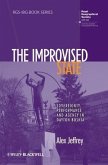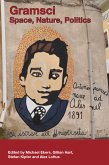Dieser Download kann aus rechtlichen Gründen nur mit Rechnungsadresse in A, B, BG, CY, CZ, D, DK, EW, E, FIN, F, GR, HR, H, IRL, I, LT, L, LR, M, NL, PL, P, R, S, SLO, SK ausgeliefert werden.
"It provides an empirically-rich,methodologically-rigorous and conceptually-grounded account of thestate 'in action'. It should prove to be essentialreading for all those social scientists interested in the state butwill also provide inspiration for all those interested in politicalgeography, understandings of power and notions ofperformance." Professor Rhys Jones, AberystwythUniversity, UK (Cultural Geographies, January 2014, vol. 21 no.1 165-166)
'Consistently strong throughout its sections and chapters,Jeffrey has cemented his arguments with a good conceptualunderstanding, impressive fieldwork and primary research. TheImprovised State is an original contribution to both thetheoretical and research fields of political geography and criticalinternational relations scholarship.' -- David Campbell,Honorary Professor, Durham University/University of Queensland
'In this persuasive book, Alex Jeffrey illuminates the centralrole of performance in the production of state power anddemonstrates in fascinating detail why and how this is so--andwith what effects. The argument is thoroughly researched,contextually sensitive, and crisply written. The ImprovisedState is a compelling study for scholars, students, andpractitioners working on state power, international organizations,and post-conflict societies, in Europe and elsewhere.' --MerjeKuus, University of British Columbia
"In this persuasive book, Alex Jeffrey illuminates the central role of performance in the production of state power and demonstrates in fascinating detail why and how this is so--and with what effects. The argument is thoroughly researched, contextually sensitive, and crisply written. The Improvised State is a compelling study for scholars, students, and practitioners working on state power, international organizations, and post-conflict societies, in Europe and elsewhere." -- Merje Kuus, University of British Columbia









